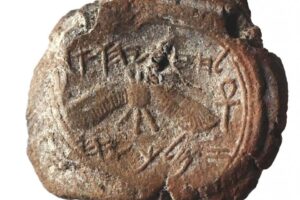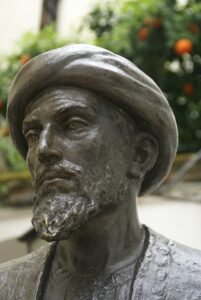Conspiracy Theory – Christianity Is a Fiction
Adversaries of Christianity sometimes argue against the reality of Jesus of Nazareth as the Messiah, even that he is not a real historical figure, by claiming Christianity itself is a fictional story. One conspiracy theory claims Christianity and thus Jesus are the result of various groups colluding to invent a morphed deity image of a messiah:[1]

“…Christianity and the story of Jesus Christ were created by members of various secret societies, mystery schools and religions in order to unify the Roman Empire under one state religion. …this multinational cabal drew upon a multitude of myths and rituals that existed long before the Christian era, and reworked them for centuries into the religion passed down to us today.” – Acharya S.
Challenges to create a fictional messiah figure would have been enormous at the beginning of the millennium. Especially true in an era without any means of electronic communication, media, even the printed word.
Just the opposite occurred. Christianity rose so rapidly, Jewish leaders tried to snuff it out quickly before it spread. Rome tried to quell Christianity by killing people who professed the belief.
During the four centuries before the Roman Empire, cabals from three Empires – Babylonians, Persians and Greeks – with authority over Judea had to be complicit in this conspiracy.[2] It has to be accepted by this theory there was a long-term strategy “to unify the Roman Empire under one state religion” even though just the concept of a Roman Empire was yet unknown.
Biblical history documents the Jews themselves were warring against each and taken captive in Babylon. After the Persian overthrow of Babylon, ancient enemies still wanted to subvert the Jew’s efforts.[3]
At least one conspiracy theory ironically maintains the created fictitious messiah image was himself a Jew. Probably the most scorned, if not hated, ethnic group in the Roman Empire were Jews.
Creating a Christian religion with a Jewish messiah upped the ante of the theory to the highest degree. Judaism then and now views Christianity as blasphemous for its belief that Jesus is the Messiah.
Pilate had Jesus crucified and to refute it means declaring renowned Roman historians Tacitus, Suetonius, and Josephus as well as others were wrong. The conspiracy theory proposes that Jewish leadership was supporting Rome when, in fact, Rome was crucifying Jews by the thousands and eventually destroyed Jerusalem and the Temple in 70 AD.[4]
For the invention of a fictional Jewish messiah, the image would call for a flawless ancestral background of pure Jewish lineage, not to mention an ancestral history free of unsavory or illegal activities. Alleged collaborators would then have to weave this complex lineage into a 2000 year timeline to create a messiah narrative.
A flawed genealogy would have been a huge obstacle for anyone who attempted to “rework them for centuries into the religion passed down to us today.” According to the Gospel accounts of Matthew and Luke, Jesus was born into this flawed Jewish royal lineage.
Genealogy of Jesus of Nazareth was anything but pure and flawless. A perfect lineage of a made-up messiah was simply not possible as demonstrated time and again by Scriptural history.
Disgraceful accounts pulled straight from the Old Testament, the Tenakh, include deceptions, lies, a prostitute, Gentile intermarriages, voyeurism, adultery, murder, greed, lascivious pleasures, etc. Background lineage of Jesus involved the most ignoble examples of disobedience to God yet by turning lemons into lemonade, each involved blessings from God.
Grandson of Abraham, Jacob swindled his older twin brother’s inheritance blessing from his father, Isaac. Jacob was still later renamed by God and became the father of the 12 tribes of Israel.[5]
Jacob’s own conniving sons sold their younger brother, Joseph, into slavery and lied to their father saying he had been killed by a wild animal. Joseph went on to become the second most powerful ruler in Egypt under Pharaoh and eventually saved his Hebrew family from a famine.[6]
Rahab, a Gentile prostitute spared from the destruction of Jericho, married a Hebrew named Salmon and their son was named Boaz who became a wealthy resident of Bethlehem.[7] Boaz married the Gentile Ruth, daughter-in-law of his Jewish relative Naomi, allowing Naomi to redeem her otherwise lost inheritance.[8]
Jewish sage Rabbi Rashi professed his distaste of having a Gentile in the prophetic lineage of the Messiah. His disgust appears in his commentary on the Bethlehem prophecy of Micah 5:2:[9]
“you should have been the lowest of the clans of Judah: [Rashi] You should have been the lowest of the clans of Judah because of the stigma of Ruth the Moabitess in you.” – The Complete Jewish Bible
Grandson of Boaz and Ruth was Jesse whose son, David, became the King of Israel.[10] David committed some dastardly deeds that would be scandalous in any century.
King David’s voyeurism led to an affair with his neighbor’s wife and when his plan to cover-up her illicit pregnancy failed, the King had her husband sent to the front lines of a war knowing he would be killed.[11] In spite of this, subsequent prophecies foretold the future Messiah would come from the lineage of David.
Solomon, King David’s son, indulged in the pleasures of 700 wives and 300 concubines, many of whom were Gentiles who brought with them forbidden idolatry influences. Still, Solomon built the Temple of God and was blessed with great wealth and wisdom.[12]
Arrival of Jesus of Nazareth happened during the era when Rome was experiencing it’s height of glory. One morning dawn everything changed, rather than the alleged “centuries” to rework “the religion passed down to us today.”
Unique to Christianity and the center of its core creed are the Resurrection accounts of Jesus.[13] No one, including the followers of Jesus, ever believed a resurrection could happen before Jesus was crucified.
Afterward he was crucified, he actually had to prove his own followers that he was back from the dead. Witness accounts about Jesus rang true with people, many believed labeled as “Christians.”
Adversaries of the Resurrection accounts refuted, ridiculed, imprisoned and killed witnesses who espoused the teaching of Christianity. They were still willing to die for what they believed.
Would anyone die to defend a false legend?
Updated February 16, 2025.
This work is licensed under a Creative Commons Attribution-NonCommercial-NoDerivatives 4.0 International License.
REFERENCES:
[1] Acharya S. (Murdock, D.M.) The Christ Conspiracy. Google Books advertisement. n.d. https://books.google.com/books/about/The_Christ_Conspiracy.html?id=KnIYRi3upbEC> Stitcher. image. 2018. <https://megaphone-prod.s3.amazonaws.com/podcasts/4b9e4b82-9bf9-11e8-ad4e-23b6913e004d/image/aa316e8eb017eeb2d66bd3ab5ef8270c329c2cdb5347f0e589403a20369416bc4a7f9ac6d6f18a9a13fd4eb5c6d622a7e506238a1124dbd66019deba3532d1ee.jpeg
[2] Ezra 1:2-4, 6:7-12; 7:11-28. Spiro, Ken. “History Crash Course #27: The Greek Empire.” Aish.com. 2001. <http://www.aish.com/jl/h/cc/48939587.html> Hooker, Richard. “Hellenistic Greece: Alexander the Great.” Washington State University. 1999. <http://web.archive.org/web/20110104072822/http://www.wsu.edu/~dee/GREECE/ALEX.HTM>
[3] I Kings 11:26-12:24; Ezra 4;4, 5:6-17.
[4] Suetonius (C. Suetonius Tranquillus or C. Tranquillus Suetonius). The Lives of the Twelve Caesars. Ed. Maximilian Ihm, trans. J. C. Rolfe. University of Chicago|Bill Thayer. n.d. “The Life of Titus.” 109 AD. <https://penelope.uchicago.edu/Thayer/E/Roman/Texts/Suetonius/12Caesars/Titus*.html> “Siege of Jerusalem.” Encyclopædia Britannica. 2020. <https://www.britannica.com/event/Siege-of-Jerusalem-70> Josephus, Flavius. Wars of the Jews. Book II, Chapter XIV, Book V, Chapter XI.. <http://books.google.com/books?id=e0dAAAAAMAAJ&printsec=frontcover&source=gbs_ge_summary_r&cad=0#v=onepage&q&f=false>
[5] Genesis 25; 27-28.
[6] Genesis 37; 41-46.
[7] Joshua 2, 6, Ruth 4; I Chronicles 2:1-17.
[8] Ruth 2-4.
[9] The Complete Jewish Bible with Rashi’s Commentary. Micah 5:2 Rashi commentary.
[10] Ruth 4; I Chronicles 2:10.
[11] 2 Samuel 11-12.
[12] 2 Chronicles 7, 9; I Kings 7-8, 10.
[13] I Corinthians 15:3-4.


